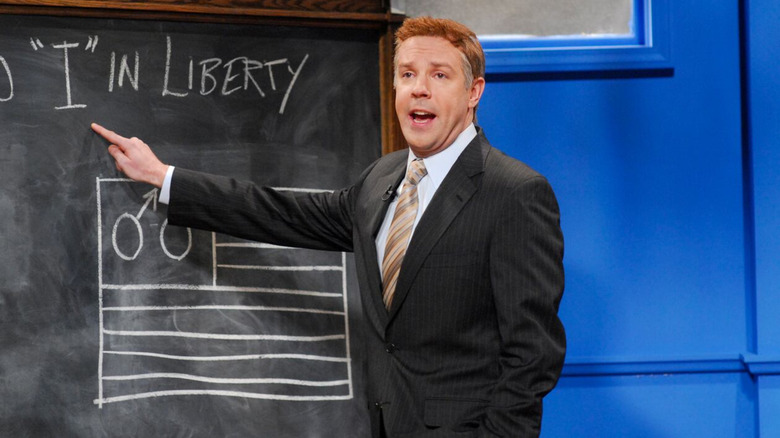
To hear Jason Sudeikis talk about it, "Saturday Night Live" is the best thing that can happen to a comedian, and also the worst. Public exposure, he once felt, came at a great price.
Before he wrote for "SNL," Sudeikis was working with the Las Vegas branch of Chicago's celebrated Second City comedy troupe. The Second-City-to-"SNL" pipeline has always been quite direct, and many alumni from Chicago would go on to become well-known names in Lorne Michaels' famed New York TV program. Dan Aykroyd, Gilda Radner, John Belushi, Chris Farley, Tim Meadows, Mike Myers, Tina Fey, Amy Poehler, and Aidy Bryant are all Second City veterans.
While Sudeikis began writing for "SNL" in the early 2000s and was brought on as a cast member in 2005, he admits he initially felt hostile toward the show. He knew that being involved with "SNL" would be a great career move, but being involved in the Las Vegas Second City was more appealing at the time. Forming something from the ground up and tapping into older, admittedly stodgy theatrical traditions was, to Sudeikis, the more desirable career path. Meanwhile "SNL," he reasoned, was the best way to become a corporate comedian sellout. Indeed, living in Las Vegas gave Sudeikis access to a much more interesting performance opportunity: Blue Man Group, the surrealist comedy/music/performance art act that was founded in 1987.
Sudeikis' sense of purity was eventually sullied, but he swallowed his pride, committed himself to writing, and has become one of the world's more famous comedians. He laid out his path from Las Vegas to New York on a recent episode of the "Off Camera" podcast.
The Living Graveyard
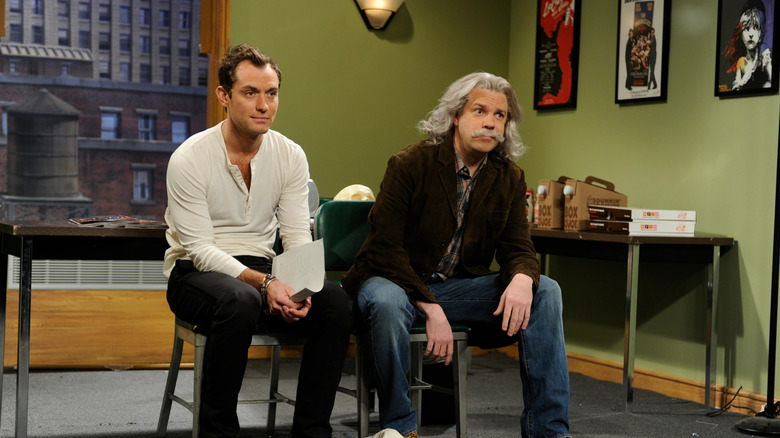
Jason Sudeikis recalls his path to "SNL" with clarity:
"I auditioned for the show in August of 2003. At that point, I was living in Las Vegas, working at Second City. They had opened up a theater there ... I got to be on the ground floor of something and help create it and shape it. We had amazing people, people that were my contemporaries, people I looked up to, all of us trying to figure out how to make this social, political, satirical theater based in improvisation and sketch comedy work in this town, which is like a living graveyard in a lot of ways."
While trying to resurrect the dead of Las Vegas, Sudeikis recalls getting an opportunity from an old friend ... who just happened to be married to one of the more famous "SNL" cast members at that time. While some might consider a particular offer that the comedian received to be a great career boon, Sudeikis didn't feel that way. He said:
"Two things happened. Jeff Richmond, who was one of my heroes and a mentor of mine, eventually a friend who was a director at Second City and a musical director -- who had been married to Tina Fey -- came and saw our show and did like a week's worth of rehearsal, like three rehearsals with us, and added 20% more laughs. [...] He asked me, 'Would you ever audition for "SNL?"' And at that point, I was adamant: 'No.'"
The interviewer was befuddled. "SNL" has a reputation for being the place most comedians aspire to be. To hear a grumpy Gen-Xer pooh-pooh it was mildly shocking. Sudeikis explained his logic.
SNL Is McDonald's
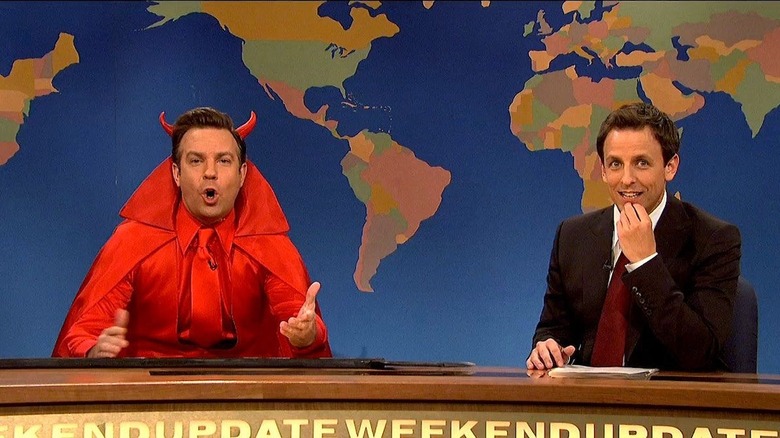
The comedian laid out the fundamental differences between exploring satire on stage and making commercially viable comedy shows underneath the banner of a giant entertainment corporation. Those who perform will likely be hip to Jason Sudeikis' lingo, and understand the organic nature of forming comedy from the ground up, rather than merely churning it out regularly. He said:
"[W]hen you come from the Chicago experience, it's about the process. 'SNL' is a product-based, ad show business in Hollywood. That's nothing that we're ... we work for, or work toward, or speak on within the Chicago improv community. Like, you don't do impressions. There's no impression class. Like you're trying to make impressions but you're not trying to do impressions, right?"
It sounds like Sudeikis is referring to properly acting, rather than merely goofing around. Sudeikis acknowledged that, even though he did do impersonations on "SNL," it was never his strong suit, nor seemingly his goal. He was eager to stay out of corporate comedy. This hate was, he also admitted, a stage that every young comedian eventually passes through. If one fancies themselves a comedic maverick, there will be a time when "SNL" is the enemy. Sudeikis said:
"[A]ny knack that I had for [impression] -- which isn't as gifted as someone like Bill Hader or Darrell Hammond or Jay Pharaoh, it was just from mimicking friends, mimicking coaches, so I have that. But I f***ing hated 'SNL.' You have to hate 'SNL' at some point during your comedy journey, because it's McDonald's [...] I was adamant about it. I had my strong philosophies about it, that were fueled by 23 year-old, self righteous arrogance."
Are They Still Funny?
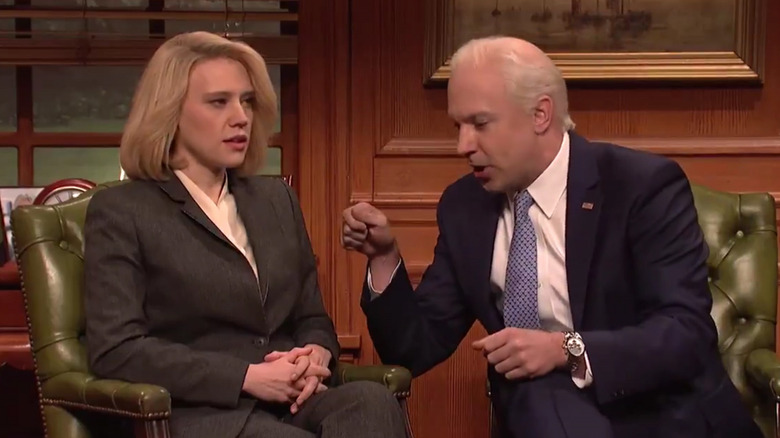
Do you want to make haute cuisine or a crappy burger that many people still seem to buy in mass quantities? For a comedian in his 20s, it was decidedly the former.
As the Second City became more corporate, Jason Sudeikis admitted he wanted out of that too. He recalls talking to talent agents who were clearly scouting him and his peers for higher positions in showbiz and recalled feeling nothing but anger and resentment. He was an "omelet at 3 a.m." kind of guy, not the type to schmooze. He turned down a second explicit offer after a show, knowing he hated the scout he talked to.
Sudeikis recalled the conversation he had with said scout. He said directly to her face that "Saturday Night Live" makes people less funny, not more funny. The scout announced she represented several "SNL" cast members, and Sudeikis threw the gauntlet. He asked the scout if her clients had ever made her laugh on "SNL" as they did when she first scouted them. She said no. There, Sudeikis said, was the proof.
"Ultimately," Sudeikis said, "that show doesn't want me. So f*** that show." He was quick to amend his hard words with an admission that a lot of it was sour grapes, and that he really did feel a pang of envy and was perhaps a little too arrogant. "It's not that I wasn't good enough," he said, before pausing to reflect. "No, it's that I wasn't good enough."
Blue Man Group
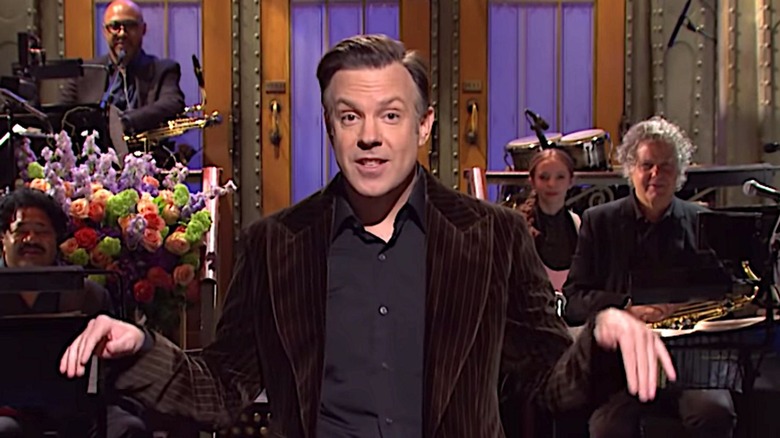
This is when Blue Man Group appeared on his radar. For those unfamiliar, Blue Man Group is a surrealist musical performance act about three silent, bald, blue-skinned men, perhaps androids or extraterrestrials, performing a series of bizarre on-stage feats. They perform percussion but also do simple marshmallow-based tricks. To this day, they're difficult to describe. The costume is also elaborate, requiring a lot of makeup, a very particular kind of facial features -- the Blue Men do not emote -- and a bald head. Yes, Jason Sudeikis shaved his head for the part. He said:
"[I auditioned] three times actually: Right when I first moved to Chicago, and I couldn't do accented triplets. Then I auditioned again four years later in Las Vegas. I practiced all the time, had drum pads, had mallets, knew pieces from the show that dudes had taught me, and I drummed all the time. [...] I still didn't get it. Well, I didn't have the right face for it. Those guys look like superheroes, and when I put on the blue makeup, and I saw myself in the mirror, I look like a f***ing peanut M&M, like a big blue peanut M&M. Just like, 'Oh no, I shouldn't do this.'"
In a way, Sudeikis' jawline forced him back into the arms of "SNL." Disheartened after the Blue Man incident, and still depressed following the events of 9/11, Sudeikis was asked one more time to send in an audition tape. This time he did. By 2003, he was writing on the show.
Sudeikis worked on "SNL" from 2003 to 2013. As of this writing, he has won several Emmys for his TV series "Ted Lasso."
Read this next: 12 Underrated Sitcoms That You Should Check Out
The post Jason Sudeikis Originally Had No Interest in SNL, But Did Audition for Blue Man Group appeared first on /Film.
